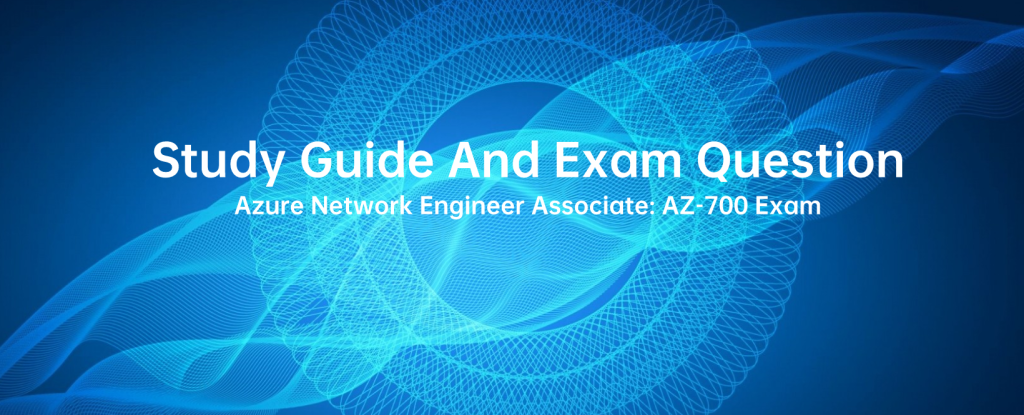
Pass4itSure’s Latest AZ-700 Practice exam questions PDF+VCE(https://www.pass4itsure.com/az-700.html) can effectively help you pass the Azure Network Engineer Associate: AZ-700 exam with ease. This blog focuses on how to prepare for the exam and shares the latest AZ-700 practice exam questions to guide you through the Microsoft AZ-700 exam with ease.
Whether you’ve registered for the Azure Network Engineer Associate AZ-700 exam and are fully committed to preparing for it. I’m still thinking about how to prepare to get my Azure Network Engineer Associate certificate. Either way, you’ll benefit from this blog.
With a helpful heart, I have compiled my more than ten years of preparation experience into this article “Azure Network Engineer Associate: AZ-700 Exam Latest Study Guide And Exam Question Sharing”, hoping to help you.
AZ-700 Exam: An Up-to-date study guide
The first step is to create a study plan
Planning is crucial to keep things organized, and the AZ-700 exam is no exception. If you don’t make proper arrangements, you will only panic and become nervous. The following is a learning plan to prepare for AZ-700 Designing and Implementing Microsoft Azure Networking Solutions, for your reference and adjustment, I hope it will inspire you.
| Serial number | Learning content | Timing |
| 1 | Skim the AZ-700 exam officially and familiarize yourself with the main knowledge points and points. | Week 1 |
| 2 | Learn according to videos, and instructor courses, draw mind maps, and output study notes | Week 2 ~ Week 10 |
| 3 | Exam practice training | Week 11~Week 14 |
| 4 | Continue to practice for the exam until you take the official exam | until exam |
The second step is to choose a learning method
Pareto’s Law: Make the most of 20% of your time and create 80% of your value.
In preparing for the AZ-700 exam, we need to learn to prioritize urgent and critical knowledge points, solve important and urgent problems, work on urgent but unimportant knowledge, and discuss non-urgent and unimportant knowledge in our leisure time.
The core learning content is as follows:
- In-depth analysis of mock test questions to ensure that the accuracy rate of mock tests is increased to more than 90%.
- Combine video lessons and notes from the questions to conduct a comprehensive review and understanding to grasp the key points and difficulties of the exam.
- Sort out the proportion and direction trend of test centers, and pay more attention to the analysis of test questions.
- Other self-provided learning tools or materials (official resources + third-party resources).
If you don’t have mock questions, you can take Pass4itSure’s latest AZ-700 mock test, which contains the latest AZ-700 questions and analysis, so that you can easily cope with the preparation process and save a lot of time and energy!
Feynman Tricks
- Pick and choose what you’re studying: Set a goal (e.g., pass the webworker exam, learn more about the webwork syllabus) take out a blank piece of paper, and write down what you need to study in depth.
- Explain to beginners: Teach others the knowledge of network work or case analysis questions you have learned in your discourse system.
- When you encounter a problem, go back to learn: When you encounter a problem and feel confused, don’t be afraid to go back to the starting point, re-consult the information, look for answers on the Internet, ask the teacher for advice, and think of all possible ways to solve the problem until the problem is completely solved, and then record it.
Through these three steps, you can grasp the knowledge of Azure network engineers faster, and imprint this knowledge deeply into your cerebral cortex, which becomes a long-term memory, and you will be able to answer questions calmly when it comes to exams.
The third step is to practice actual combat simulation
“Practice is the criterion for testing truth”. Therefore, it is very important to brush the questions, and it is even more important to brush the latest mock questions (real questions)!
To maintain a keen understanding of the questions, it is necessary to practice a certain amount of brushing questions (more than 50 questions) every day. At the same time, for the collection of questions that you remember incorrectly, especially those that are easy to make mistakes or are rare, you must consult the textbook and review the relevant knowledge points, to find and make up for your shortcomings in time.
Overall, the AZ-700 exam is quite informative, so if you want to sign up, be sure to plan your study time wisely to prepare for the exam. In addition, finding a reliable practice exam to guide you in creating, explaining, and reviewing key points will help you pass the Microsoft Certified: Azure Network Engineer Associate Certificate exam in one sitting.
The fourth trick is to take the exam calmly
On the eve of the exam, prepare the necessities such as the admission ticket and ID card in advance. If time permits, you can look at the case study questions or flip through the key knowledge points that have been marked.
During the whole exam process, follow the answering skills of easy first and then difficult, look at the options first and then look at the stem, and trust your intuition, at the same time don’t put too much psychological pressure on yourself, believe in yourself, and take the exam calmly and calmly, of course, the premise of this state is that you do the first three steps well.
Of course, everyone has a set of test preparation plans that work best for them, just like a pair of tailor-made shoes, what suits me may not be right for you. You can find the “best practices” that suit you by referring to my experience and adjusting it to your preparation plan!
The latest AZ-700 exam mock test questions are shared
free AZ-700 practice exam questions
From: Pass4itSure
Several questions: 15
Related: Microsoft
Last updated: AZ-700 practice exam questions
Question 1:
You have an Azure application gateway that has Azure Web Application Firewall (WAF) enabled.
You configure the application gateway to direct traffic to the URL of the application gateway.
You attempt to access the URL and receive an HTTP 403 error. You view the diagnostics log and discover the following error.
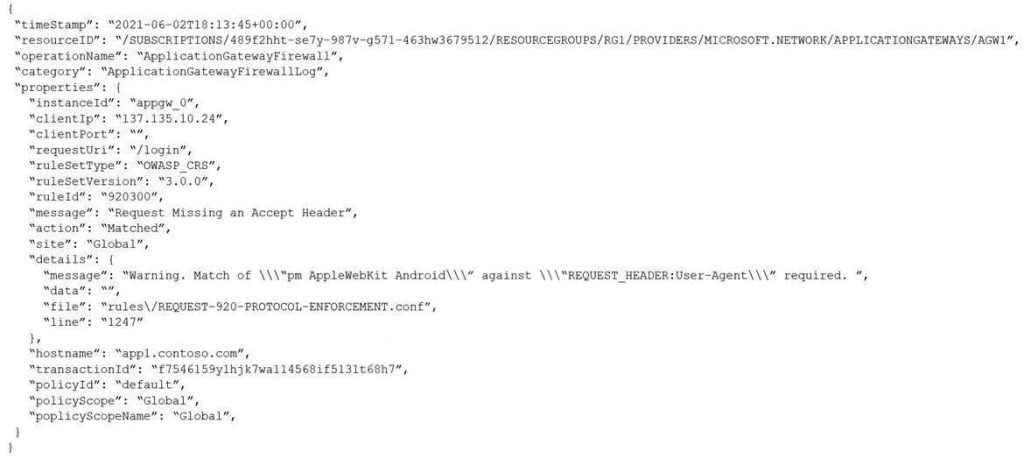
You need to ensure that the URL is accessible through the application gateway.
Solution: You configure a custom cookie and an exclusion rule.
Does this meet the goal?
A. Yes
B. No
Correct Answer: B
The log shows that the WAF rule with ruleId 920300 was triggered. Instead, we should disable the WAF rule that has a ruleId 920300.
Question 2:
You need to provide VMware SD-WAN connectivity to your clients. Which Azure resource should you deploy?
A. Network Virtual Appliance (NVA).
B. Point-to-site VPN Gateway
C. Local network gateway
Correct Answer: A
Correct Answer(s):
Network Virtual Appliance (NVA) – Azure Virtual WAN supports connections from networking partners, such as VMware SD-WAN. These types of devices are known as network virtual appliances (NVAs).
Wrong Answers:
Point-to-site VPN Gateway – A point-to-site VPN Gateway supports connections from individual computers.
Local network gateway – A local network gateway represents the on-premises network.
Question 3:
You have an Azure subscription that is linked to an Azure Active Directory (Azure AD) tenant named contoso.onmicrosoft.com. The subscription contains the following resources:
1.An Azure App Service app named App1
2.An Azure DNS zone named contoso.com
3.An Azure private DNS zone named private.contoso.com
4.A virtual network named Vnet1
You create a private endpoint for App1. The record for the endpoint is registered automatically in Azure DNS.
You need to provide a developer with the name that is registered in Azure DNS for the private endpoint.
What should you provide?
A. app1.contoso.onmicrosoft.com
B. app1.private.contoso.com
C. app1.privatelink.azurewebsites.net
D. app1.contoso.com
Correct Answer: C
Question 4:
HOTSPOT
You need to recommend a configuration for the ExpressRoute connection from the Boston data center. The solution must meet the hybrid networking requirements and business requirements.
What should you recommend? To answer, select the appropriate options in the answer area.
NOTE: Each correct selection is worth one point.
Hot Area:

Correct Answer:

For the first question, only ExpressRoute GW SKU Ultra Performance supports the FastPath feature.
For the second question, vnet1 will connect to ExpressRoute gw, once Vnet1 peers with Vnet2, the traffic from the on-premise network will bypass GW and Vnet1, and directly go to Vnet2, while this feature is under public preview.
Reference: ExpressRoute virtual network gateway is designed to exchange network routes and route network traffic. FastPath is designed to improve the data path performance between your on-premises network and your virtual network. When enabled, FastPath sends network traffic directly to virtual machines in the virtual network, bypassing the gateway.
To configure FastPath, the virtual network gateway must be either:
Ultra Performance ErGw3AZ
VNet Peering – FastPath will send traffic directly to any VM deployed in a virtual network peered to the one connected to ExpressRoute, bypassing the ExpressRoute virtual network gateway.
https://docs.microsoft.com/en-us/azure/expressroute/about-fastpath
Gateway SKU
https://docs.microsoft.com/en-us/azure/expressroute/expressroute-about-virtual-networkgateways
Question 5:
You need to recommend a configuration for the ExpressRoute connection from the Boston data center. The solution must meet the hybrid networking requirements and business requirements. What should you recommend for minimizing the latency of traffic to Vnet2?
A. Create a dedicated ExpressRoute circuit for Vnet2
B. Connect Vnet2 directly to the ExpressRoute circuit
C. Configure gateway transit for the peering between Vnet1 and Vnet2
Correct Answer: C
Scenario:
Health Engine wants to minimize costs whenever possible, as long as all other requirements are met.
The latency of the traffic between the Boston data center and all the virtual networks must be minimized. The Boston data center must connect to the Azure virtual networks by using an ExpressRoute FastPath connection.
Gateway transit allows you to share an ExpressRoute or VPN gateway with all peered VNets and lets you manage the connectivity in one place. Sharing enables cost-savings and reduction in management overhead.
Question 6:
You have an Azure subscription that contains the following resources:
A virtual network named Vnet1
A subnet named Subnet1 in Vnet1
A virtual machine named VM1 that connects to Subnet1
Three storage accounts named storage1, storage2, and storage3
You need to ensure that VM1 can access storage1. VM1 must be prevented from accessing any other storage accounts.
To achieve the requirement, you create a network security group (NSG) and associate the NSG to Subnet1.
Did you achieve the requirement?
A. Yes
B. No
Correct Answer: B
Creating an NSG on the Subnet does not limit the traffic. You also need to define the NSG rules.
Question 7:
Which rules should you configure in Azure firewall to allow inbound internet connections?
A. Application rules
B. Network rules
C. NAT rules
Correct Answer: C
Correct Answer(s):
NAT rules: Configure DNAT rules to allow incoming Internet connections.
https://docs.microsoft.com/en-us/azure/firewall/firewall-faq#what-are-some-azure-firewall-concepts
Wrong Answers:
Application rules – Configure fully qualified domain names (FQDNs) that can be accessed from a subnet.
Network rules – Configure rules that contain source addresses, protocols, destination ports, and destination addresses.
Question 8:
HOTSPOT
For each of the following statements, select Yes if the statement is true. Otherwise, select No. NOTE: Each correct selection is worth one point.
Hot Area:

Correct Answer:

Question 9:
You have an Azure subscription that contains the following resources:
A virtual network named Vnet1
A subnet named Subnet1 in Vnet1
A virtual machine named VM1 that connects to Subnet1
Three storage accounts named storage1, storage2, and storage3
You need to ensure that VM1 can access storage1. VM1 must be prevented from accessing any other storage accounts.
To achieve the requirement, you create a network security group (NSG). You configure a service tag for Microsoft Storage and link the tag to Subnet1.
Did you achieve the requirement?
A. Yes
B. No
Correct Answer: B
This will either allow or deny traffic to all storage accounts from all virtual machines in Subnet1.
Question 10:
You have an Azure subscription that contains four virtual machines. The virtual machines host an app named App1.
You deploy an Azure Standard Load Balancer named LB1 to load balance incoming HTTPS requests to App1.
You need to reduce how long it takes for LB1 to stop sending App1 traffic to failed servers. The solution must minimize administrative effort.
What should you modify?
A. The backend pools settings
B. The diagnostic settings
C. The load-balancing rules
D. The health probes settings
Correct Answer: D
Azure Load Balancer rules require a health probe to detect the endpoint status. The configuration of the health probe and probe responses determines which backend pool instances will receive new connections. Use health probes to detect
the failure of an application. Generate a custom response to a health probe. Use the health probe for flow control to manage load or planned downtime. When a health probe fails, the load balancer will stop sending new connections to the respective unhealthy instance. Outbound connectivity isn’t affected, only inbound.
Add a TCP health probe
In this example, you\’ll create a TCP health probe to monitor port 80.
1. Sign in to the Azure portal.
2. In the search box at the top of the portal, enter Load balancer. Select Load balancers in the search results.
3. Select myLoadBalancer or your load balancer.
4. In the load balancer page, select Health probes in Settings.
5. Select + Add in Health probes to add a probe.
6. Etc.
Reference: https://learn.microsoft.com/en-us/azure/load-balancer/load-balancer-custom-probe-overview https://learn.microsoft.com/en-us/azure/load-balancer/manage-probes-how-to
Question 11:
HOTSPOT
FirewallPolicy1 contains the following rules:
1.Allow outbound traffic from Vnet1 and Vnet2 to the internet.
2.Allow any traffic between Vnet1 and Vnet2.
No custom private endpoints, service endpoints, routing tables, or network security groups (NSGs) were created. For each of the following statements, select Yes if the statement is true. Otherwise, select No. NOTE: Each correct selection is worth one point.
Hot Area:

Correct Answer:

Question 12:
You have an Azure environment.
You need to create a private connection between Azure PaaS and hosted services.
Which Azure Service should you deploy?
A. Azure Private Link
B. Azure Service Endpoint
C. Azure NaaS (network as a service)
Correct Answer: A
Correct Answer(s):
Azure Private Link Azure Private Link enables you to access Azure PaaS Services (for example, Azure Storage and SQL Database) and Azure-hosted customer-owned/partner services over a private endpoint in your virtual network.
https://docs.microsoft.com/en-us/azure/private-link/private-link-overview
Wrong Answers:
Azure Service Endpoint – Azure Service Endpoint provides secure and direct connectivity to Azure PaaS services over an optimized route over the Azure backbone network.
Azure NaaS (network as a service) – There is no such service as Azure NaaS.
Question 13:
Your on-premises network contains a DNS server named Server1.

You have an Azure subscription that contains the resources shown in the following table.
The on-premises network is connected to VNet1 by using a Site-to-Site (S2S) VPN.
You need to ensure that Server1 can resolve the DNS name of storage1. The solution must minimize costs and administrative effort.
What should you use?
A. Azure DNS Private Resolver
B. an Azure public DNS zone
C. an Azure Private DNS zone
D. an Azure virtual machine that hosts a DNS service
Correct Answer: A
Azure DNS Private Resolver is a new service that enables you to query Azure DNS private zones from an on-premises environment and vice versa without deploying VM-based DNS servers. https://learn.microsoft.com/en-us/azure/dns/dns-private-resolver-overview
Question 14:
DRAG DROP
You have an Azure subscription that contains a virtual network named Vnet1 and an Azure SQL database named SQL1. SQL1 has a private endpoint on Vnet1.
You have a partner company named Fabrikam, Inc. Fabrikam has an Azure subscription that contains a virtual network named Vnet2 and a virtual machine named VM1. VM1 is connected to Vnet2.
You need to provide VM1 with access to SQL1 by using an Azure Private Link service.
What should you implement on each virtual network? To answer, drag the appropriate resources to the correct virtual networks. Each resource may be used once, more than once, or not at all. You may need to drag the split bar between
panes or scroll to view content.
NOTE: Each correct selection is worth one point.
Select and Place:
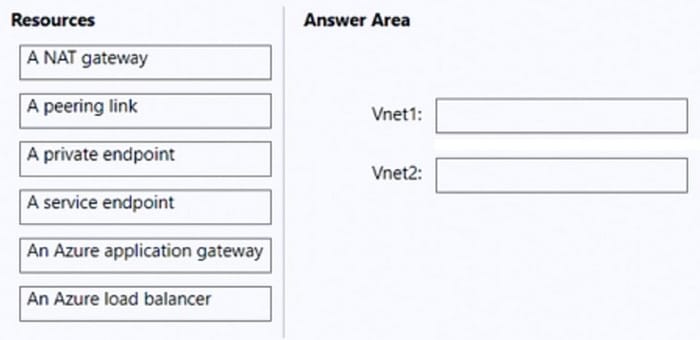
Correct Answer:
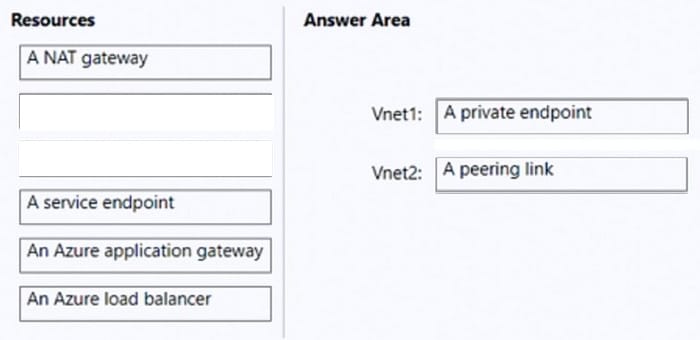
Box 1: A private endpoint
You can connect to an Azure SQL server using an Azure Private Endpoint
Create an Azure SQL server and private endpoint.
Test connectivity to the SQL server’s private endpoint.
Note: Azure Private endpoint is the fundamental building block for Private Link in Azure. It enables Azure resources, like virtual machines (VMs), to privately and securely communicate with Private Link resources such as Azure SQL server.
Box 2: A peering link
Use cases of Private Link for Azure SQL Database
Clients can connect to the Private endpoint from the same virtual network, peered virtual network in the same region, or via virtual network to virtual network connection across regions. Additionally, clients can connect from on-premises using
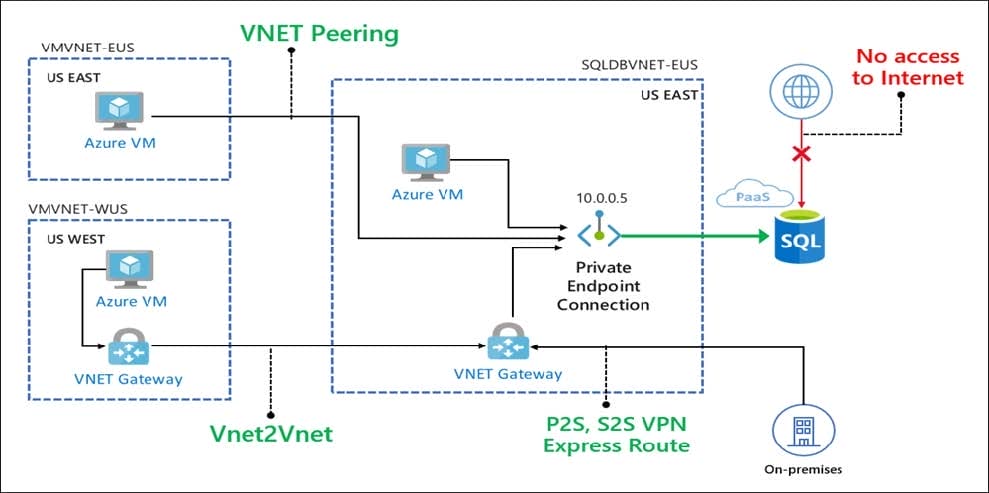
ExpressRoute, private peering, or VPN tunneling. Below is a simplified diagram showing the common use cases.
Question 15:
You have 10 Azure App Service instances. Each instance hosts the same web app. Each instance is in a different Azure region.
You need to configure Azure Traffic Manager to direct users to the instance that has the lowest latency.
Which routing method should you use?
A. geographic
B. weighted
C. performance
D. priority
Correct Answer: C
Select Performance routing when you have endpoints in different geographic locations and you want end users to use the “closest” endpoint for the lowest network latency.
Reference: https://docs.microsoft.com/en-us/azure/traffic-manager/traffic-manager-routing-methods
Additional learning resources supplement:
- Preparing for AZ-700 – Design and implement core networking infrastructure (1 of 5)
- Preparing for AZ-700: Design, implement, and manage connectivity services (2 of 5)
- Preparing for AZ-700: Design and implement application delivery services (3 of 5)
- Preparing for AZ-700: Design and implement private access to Azure services (4 of 5)
- Preparing for AZ-700: Secure network connectivity to Azure resources (5 of 5)
- AZ-700 Designing and Implementing Microsoft Azure Networking Solutions – Training
- Microsoft Certified: Azure Network Engineer Associate – Certifications
- Microsoft Certified: Azure Network Engineer Associate – Certifications
- Practice Assessment
- Azure Community Support
- Azure documentation
- Virtual Private Networking (VPN)
- Microsoft Entra ID documentation
- RADIUS authentication with Azure Active Directory
- Azure ExpressRoute Overview
- Create virtual network (VNet)
- DNS Zones and Records overview – Azure DNS
- Azure Virtual WAN Overview
- Azure Route Server documentation
- Load Balancer
- Azure Application Gateway documentation
- Azure Front Door and CDN documentation
- Azure Traffic Manager
- Azure NAT Gateway documentation
- Azure Firewall documentation
- Web Application Firewall documentation
- Azure Monitor documentation
- What is Azure Private Link?
- Manage Azure Private Endpoints
Conclusion
Mastering the Microsoft AZ-700 exam requires proper study guidance as well as practicing the latest AZ-700 practice exam questions. By using Pass4itSure’s latest AZ-700 practice exam questions PDF+VCE (https://www.pass4itsure.com/az-700.html), you’ll be equipped to tackle the exam and confidently achieve your certification goal of winning the Azure Network Engineer Associate.